Catégories
|
Thésaurus IAMM > SYSTEME AGROALIMENTAIRE
SYSTEME AGROALIMENTAIRESynonyme(s)Système alimentaireVoir aussi |
Documents disponibles dans cette catégorie (1100)
 Ajouter le résultat dans votre panier Affiner la recherche
Ajouter le résultat dans votre panier Affiner la recherche
Article
Sustainability in the agri-food sector has become a cornerstone of global efforts to combat climate change, ensure food security through climate-smart agriculture, and strengthen economic resilience. Sustainability reporting within agri-food sys[...]
Article
This study advances the reconceptualization of Open municipal markets (OMMs) as networked ecosystems that connect food producers, vendors and citizenship across rural and urban contexts, sustaining short food supply chains and reinforcing territ[...]
Article
This study aims to investigate the potential mutual interdependence between an environment that fosters and encourages innovation and the economic performance of agricultural businesses operating in the sector. Specifically, it seeks to determin[...]
Article
Carbon and water footprint methodologies are widely used in agri-food systems, yet their organisational application, particularly in cooperatives, remains limited. This study addresses this gap by quantifying the carbon footprint (CF) and water [...]
Article
H. Zhen ; B.A. Andersen ; V. Colomb ; K. Boone ; L. Mogensen ; F. Hashemi ; M.T. Knudsen |Ecolabels play a crucial role in achieving responsible production and consumption. Current LCA-based food ecolabels suffer from inconsistent methodologies, leading to significant variability in the estimated sustainability performance for the sa[...]
Article
Agriculture's environmental footprint is sustainably challenging in terms of environmental footprint, a context in which the main focus of our research lies on identifying directions for specific sustainable practices in the EU27 for the period [...]
Article
The sustainable development of agrifood systems is a pressing global challenge, highlighting the need for frameworks that guide responsible investment and community engagement. The Principles for Responsible Investment in Agriculture and Food Sy[...]
Article
Food production is among the most environmentally intensive human activities, and its impacts are intensifying under population growth and increasingly resource-demanding consumption patterns. Agricultural practices have responded through the ex[...]
Article
S. Dysard ; S. Mayhew ; M. Ranganathan ; P. Milsom ; H. Walls |The globally dominant industrialised food system, which encompasses the interrelated actors and activities involved in producing, processing, distributing, preparing and consuming food, in its current form contributes to the global burden of foo[...]
Article
S. Hirth ; E. Morgan ; R. Crastes dit Sourd ; G. Kaptan ; A. Tallontire ; W. Young |Adverse impacts of various interrelated socio-environmental crises reveal food systems as increasingly vulnerable and call for action. To improve food system resilience, we review adaptations of agri-food supply chains and suggest leverage point[...]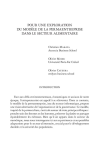
Article
Cet article explore l'application du modèle de la permaentreprise au secteur alimentaire. Inspiré de la permaculture, ce modèle repose sur trois principes éthiques : soin des humains, de la planète et partage équitable. À partir d'exemples concr[...]
Article
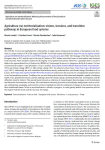
Article
N. Loodts ; C. Frison ; N. Dendoncker ; J. Hermesse |The COVID-19 crisis has highlighted the vulnerability of supply chains, bringing the possibility of disruptions to the forefront as a major concern (UN in The impact of COVID-19 on food security and nutrition. https://in.one.un.org/wp-content/up[...]
Article

Article

Article
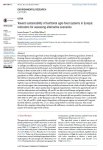
Article
Describing territorial agro-food systems through nitrogen flows between agriculture, livestock farming, human consumption, and external trade represents a useful basis for assessing the environmental sustainability of these systems. The concepts[...]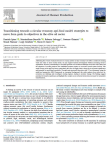
Article
D. Spina ; M. Borrello ; R. Selvaggi ; G. Chinnici ; M. Hamam ; L. Cembalo ; M. D'Amico |Addressing the overuse of natural resources is crucial, and the circular economy (CE) offers a solution by turning waste into value to meet societal needs. CE may support business development without increasing resource exploitation. However, tr[...]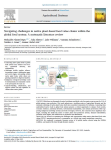
Article
M.A. Dipu ; J. Checco ; L. Williams ; Y. Sultanbawa ; N.A. Jones ; A. Abdul Aziz |CONTEXT While there are thousands of native food plants worldwide, only four major crops account for 50 % of global primary crop production. This trend underscores a troubling erosion of agricultural diversity and the systematic sidelining of na[...]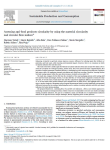
Article
Assessing agri-food products circularity by using the material circularity and circular flow indices
H. Tetteh ; M. Balcells ; A. Bala ; P. Fullana-i-Palmer ; M. Margallo ; R. Aldaco ; R. Puig |Enhancing circularity in agri-food systems improves resource efficiency by reducing inputs like fertilisers or pesticides, and food waste, while lowering environmental impacts. However, there is no consensus on which circularity indicators best [...]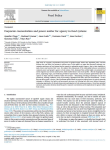
Article
High levels of corporate concentration and power in agrifood supply chains raise important policy concerns because they can affect food systems in adverse ways. In this paper, we argue that increased corporate concentration and power in food sys[...]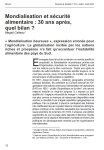
Article
« Mondialisation heureuse », expression erronée pour l'agriculture. La globalisation incitée par les nations riches et prospères n'a fait qu'accentuer l'instabilité alimentaire des pays du Sud.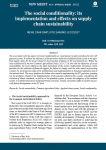
Article
The essay deals with the aspects of social conditionality as a mechanism recently introduced in the CAP payment system. It outlines the relevance of the provision within the sustainable food system in the agrifood supply chain, for the issues re[...]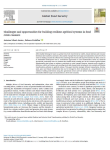
Article
After steadily declining for years on a global level, food crises driven by conflict, climate extremes and economic downturns have marked an increase in the number of people who face hunger and malnutrition since 2015. Food crises are leading co[...]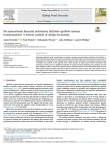
Article
J. Porciello ; P. Winters ; M. Farrae ; J. McKenna ; L. Phillips |Supporting agrifood system transformation to improve outcomes around climate, nutrition, and inclusion requires that institutions and governments work together. International financial institutions play a pivotal role in shaping global developme[...]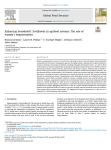
Article
R. Cavatassi ; L.M. Phillips ; G. Maggio ; Z. Anteneh ; A. Mabiso |Women's empowerment is crucial not only for their well-being but also for the well-being of entire households, communities and economies. Closing gender gaps and increasing women's empowerment in agrifood systems is critical to achieving a broad[...]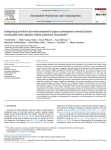
Article
V. Kyttä ; H.U. Ghani ; T. Pellinen ; A. Kårlund ; M. Kolehmainen ; A.-M. Pajari ; H.L. Tuomisto ; M. Saarinen |Environmentally sustainable and nutritionally adequate food consumption and production can include a wide selection of foods, which requires detailed information on individual food products to enable sustainable food choices. The aim of this stu[...]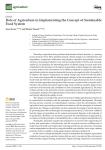
Article
Nowadays, agriculture faces problems that threaten its basic function, i [...]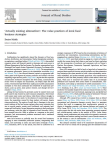
Article
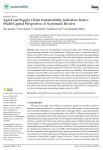
Article
A. Amamou ; S. Chabouh ; L. Sidhom ; A. Zouari ; A. Mami |The concept of sustainability in agri-food supply chains (AFSCs) is gaining traction among researchers and practitioners. There has been a considerable effort to define and identify frameworks for assessing, monitoring, and improving sustainabil[...]









